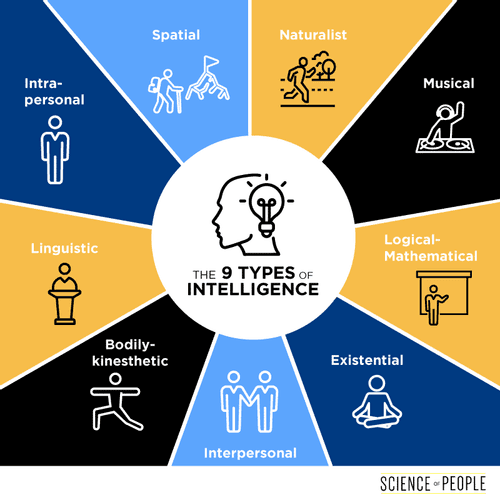What's Your Intelligence Type? | Science of People
Curated from: scienceofpeople.com
Ideas, facts & insights covering these topics:
11 ideas
·88.5K reads
381
7
Explore the World's Best Ideas
Join today and uncover 100+ curated journeys from 50+ topics. Unlock access to our mobile app with extensive features.
Multiple Intelligences
Harvard psychologist Howard Gardner described nine different types of intelligence in his book Frames Of Mind: The Theory Of Multiple Intelligences.
Each ‘type’ of intelligence can be an area of strength to a certain degree, where one excels. Everyone scores differently in this and has different levels of each type of intelligence.
1.7K
11.1K reads
Naturist - Nature Smart
There are people who find nature to be meditative and feel closely connected to trees, rivers and flowers. The natural elements around them like the clouds and the universe attracts them.
They make great astronomers, botanists, geologists and landscape architects.
1.65K
10.1K reads
Interpersonal - People Smart
Some people love interacting with friends, family and colleagues. They understand body language, and communicate better and are sensitive to others feelings, perspectives and viewpoints. This super-important intelligence type can be applied to most careers.
Interpersonal Intelligence types can have great careers as managers, psychologists, teachers and social workers.
1.7K
9.06K reads
Musical - Sound Smart
Many people have an enhanced musical sensitivity, being able to understand and differentiate between pitch, rhythm, timbre, and tone.
They can be great music conductors, composers, music teachers, and DJs.
1.54K
8.23K reads
Logical-Mathematical - Number/Reasoning Smart
Some people are numbers-oriented. They love figures and are easily able to think quantitatively and symbolically. They are great at sequential reasoning, abstract thinking and inductive/deductive thought patterns.
Logical-mathematical intelligence types can be great economists, scientists, analysts, auditors and accountants.
1.59K
7.89K reads
Bodily-Kinesthetic - Body Smart
The physical body is easily understood and handled by some people. They can dance well, use their hands to create things and have a great understanding of kinetics.
They are good at careers requiring body activity like a fitness coach, actor, athlete or physical therapist.
1.53K
7.23K reads
Spatial - Picture Smart
Mazes and jigsaw puzzles draw some people towards them. These are the spatial intelligence types, who have great graphical skills, an active imagination, along with mental imagery and spatial reasoning abilities. They can understand blueprints with ease, and have an ability to think in 3D.
Career options for spatial intelligence types can be a graphic artist, engineer, photographer and pilot.
1.6K
6.64K reads
Linguistic - Word Smart
Some people are masters of language. They can learn multiple languages, write great poetry, prose or speeches. They can communicate well and explain complex meaning. This universal type of intelligence is found in journalists, public speakers and writers.
Radio jockeys, politicians, TV hosts, and lawyers are great careers for linguistic intelligence types.
1.6K
6.44K reads
Intra-Personal - Self Smart
Some people go inward and are able to understand their own thoughts, fears, desires and emotions. They can ‘witness’ oneself and others and have a deeper level of human understanding.
Psychologists, spiritual leaders and Gurus are examples of people with high intrapersonal intelligence.
1.68K
7.31K reads
Existential - Life Smart
Some people have deep insights about life and the universe, being able to talk about existential stuff, evolution, human species and the meaning of life.
Such ‘life-smarts can be great authors, philosophers, writers and motivational speakers.
1.65K
7.41K reads
Being Intelligent
Most of us think of intelligence in a one-dimensional way, that is thrust upon us in our formative years. Excellence in academia, passing IQ tests and the ability to retain facts and figures in our memory is generally considered the definition of intelligence.
In the past few decades, this has completely changed, with intelligence now being considered as a learned skill, having multiple dimensions and variety.
1.61K
6.99K reads
IDEAS CURATED BY
Kevin Graham's ideas are part of this journey:
Learn more about personaldevelopment with this collection
Techniques for brainstorming and generating new ideas
The power of collaboration and feedback in the creative process
How to recognize and overcome limiting beliefs
Related collections
Similar ideas
18 ideas
6 ideas
How Different Psychologists Have Evaluated Intelligence
verywellmind.com
5 ideas
Five Characteristics of People With High Existential Intelligence
exploringyourmind.com
Read & Learn
20x Faster
without
deepstash
with
deepstash
with
deepstash
Personalized microlearning
—
100+ Learning Journeys
—
Access to 200,000+ ideas
—
Access to the mobile app
—
Unlimited idea saving
—
—
Unlimited history
—
—
Unlimited listening to ideas
—
—
Downloading & offline access
—
—
Supercharge your mind with one idea per day
Enter your email and spend 1 minute every day to learn something new.
I agree to receive email updates

